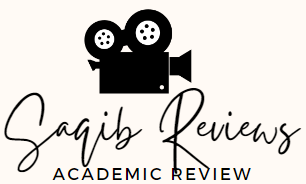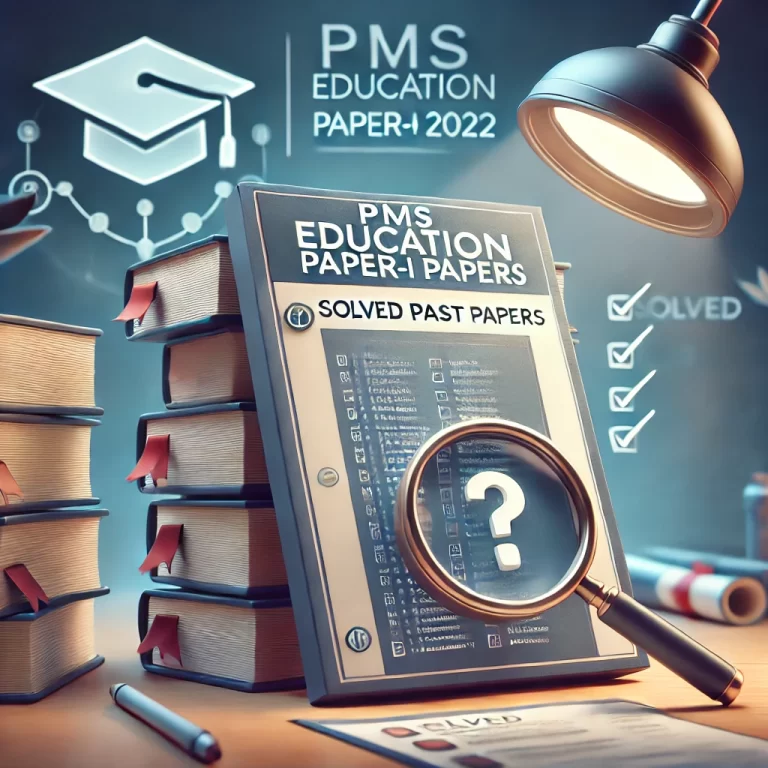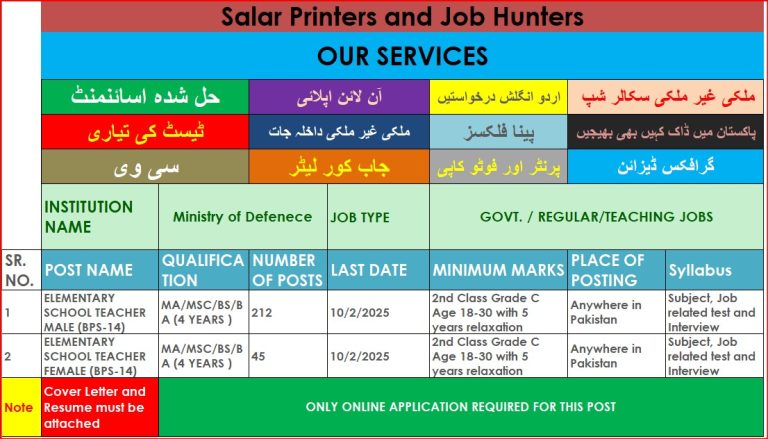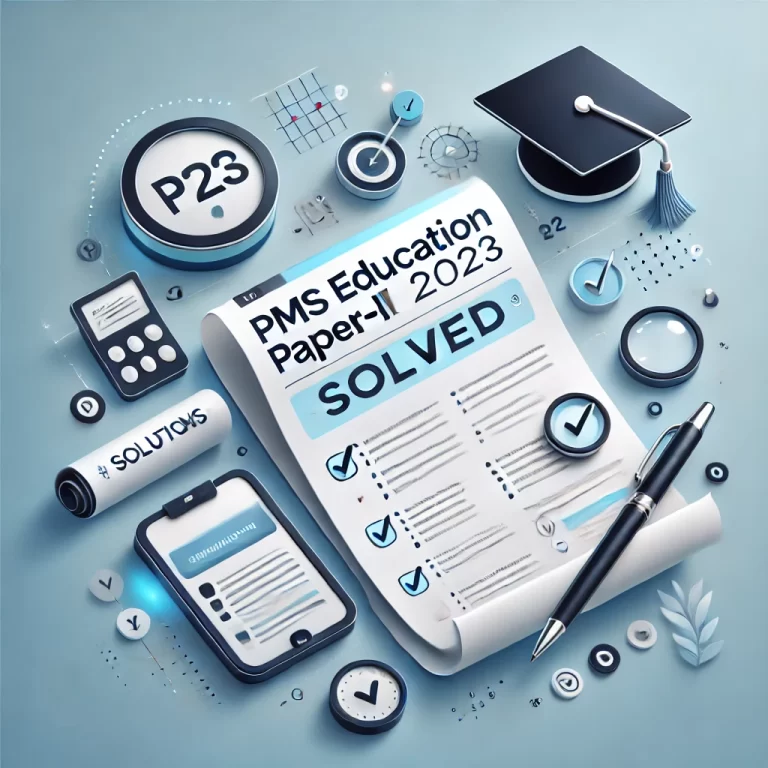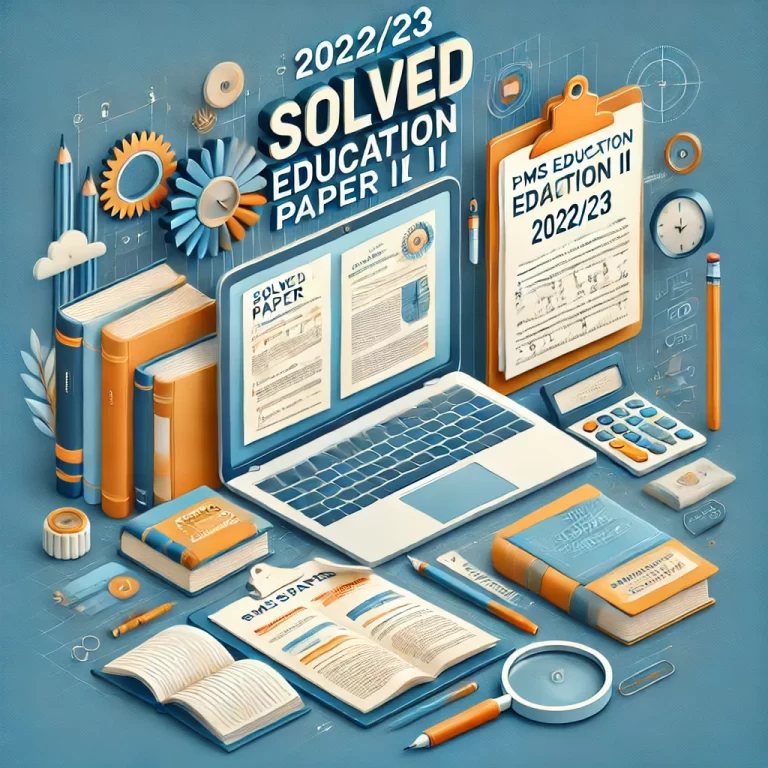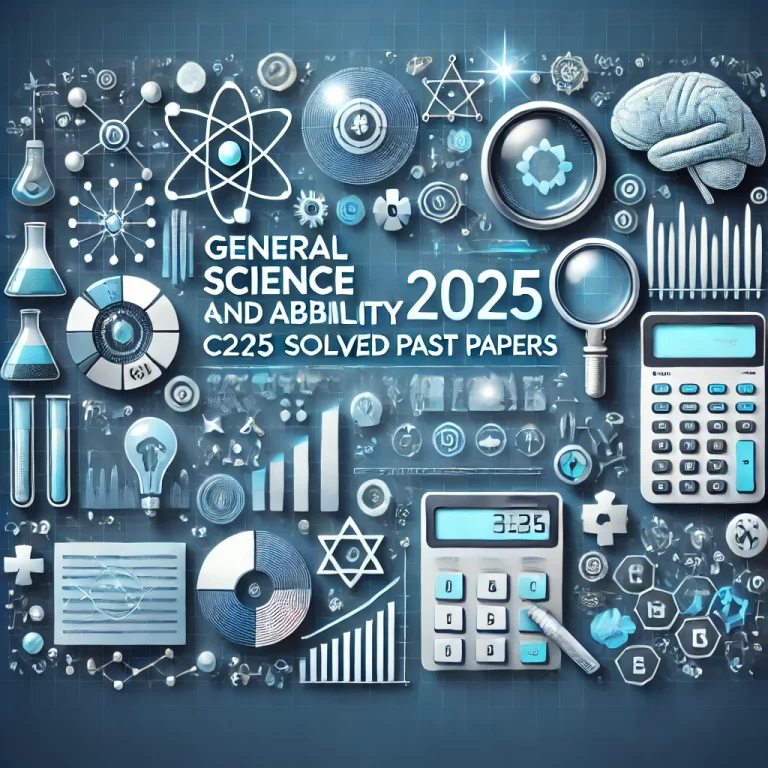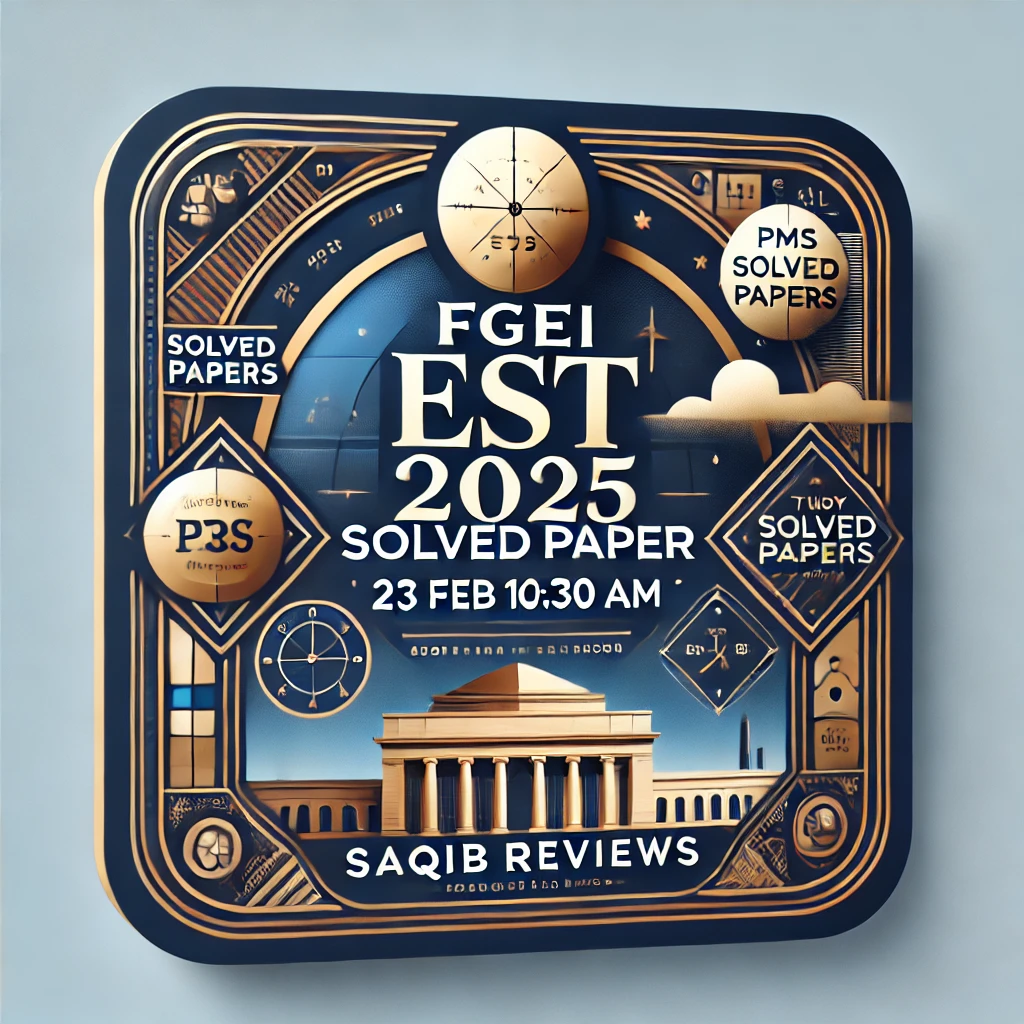
“Verily, with hardship comes ease.” (Quran 94:6)
FGEI EST Test 2025 Solved Paper
23 February 2025 | All Centers
1. Which of the following is a synonym for “breakneck”?
(A) leisurely
(B) dangerous
(C) slow
(D) rapid
Answer: (D) rapid
Explanation: “Breakneck” describes something done at extremely high speed.
2. Complete the sentence with the correct preposition: She writes ______ blue ink.
(A) with
(B) by
(C) in
(D) at
Answer: (C) in
Explanation: The preposition “in” is used when referring to writing instruments.
3. Change the voice: I know him.
(A) He is known by me.
(B) He is known to me.
(C) He is known by me.
(D) He has been known to me.
Answer: (B) He is known to me.
Explanation: The correct passive voice structure uses “known to” in this context.
4. Change into indirect speech: He said to me: “Do you like rice?”
(A) He asked me if I liked rice.
(B) He asked me if I like rice.
(C) He asked me if I liked rice?
(D) He said to me if I liked rice.
Answer: (A) He asked me if I liked rice.
Explanation: Indirect speech requires tense shifting to past and uses “asked”.
5. If I had worked hard, I ______ passed the test.
(A) would
(B) would had
(C) would have
(D) will have
Answer: (C) would have
Explanation: Third conditional structure requires “would have + past participle”.
6. Persimmon is a ______.
(A) vegetable
(B) bread
(C) star
(D) fruit
Answer: (D) fruit
Explanation: Persimmon is a sweet, edible fruit grown in northern Pakistan.
7. Choose the correct spelling:
(A) mortgage
(B) mortgage
(C) mortgage
(D) mortgage
Answer: (A) mortgage
Explanation: All options are identical. “Mortgage” is a property loan term.
8. Words have no link with their meanings:
(A) alteration
(B) person fixation
(C) arbitrariness
(D) remoteness
Answer: (C) arbitrariness
Explanation: Linguistic concept where words aren’t inherently related to meanings.
9. Identify the exclamatory sentence:
(A) Stop talking
(B) I like ice-cream
(C) What an amazing performance!
(D) Are you coming?
Answer: (C) What an amazing performance!
Explanation: Exclamatory sentences start with ‘What/How’ and end with ‘!’.
10. Best synonym for “fortitude”:
(A) determination
(B) courage
(C) resilience
(D) weakness
Answer: (B) courage
Explanation: Fortitude means mental strength in adversity.
11. Life is a continuous changing process” is the base of which educational philosophy?
(A) Perennialism
(B) Essentialism
(C) Progressivism
(D) Reconstructionism
Answer: (C) Progressivism
Explanation: Progressivism emphasizes adapting to life changes.
12. Which type of counseling focuses on helping individuals explore and understand their thoughts and feelings?
(A) directive
(B) non-directive
(C) behavioral
(D) cognitive
Answer: (B) non-directive
Explanation: Client-centered approach for personal discovery.
13. Classroom environment will be “Teacher Centered” if the teacher is ______.
(A) Pragmatist
(B) Naturalist
(C) Idealist
(D) Socialist
Answer: (C) Idealist
Explanation: Focuses on teacher-led moral instruction.
14. Which assessment method evaluates Student Learning Outcomes (SLOs) during the lesson?
(A) diagnostic
(B) formative
(C) summative
(D) evaluative
Answer: (B) formative
Explanation: Ongoing assessment to monitor learning progress.
15. Teaching through the deductive method is from ______.
(A) general→specific
(B) macro→micro
(C) easy→hard
(D) specific→general
Answer: (A) general→specific
Explanation: Starts with theories then applies to examples.
16. Projective techniques are used to measure ______.
(A) achievement
(B) intelligence
(C) aptitude
(D) personality
Answer: (D) personality
Explanation: Reveals hidden personality traits through ambiguous stimuli.
17. Reliability of an assessment relates to the ______ of an assessment.
(A) usefulness
(B) Quality
(C) consistency
(D) relevance
Answer: (C) consistency
Explanation: Consistent results under similar conditions.
18. Pedagogy is a Greek word which literally means ______ the child.
(A) understand
(B) guide
(C) educate
(D) lead
Answer: (D) to lead
Explanation: From Greek “paidagōgos” (child leader).
19. The most complex skill of Bloom’s taxonomy is ______.
(A) Characterizing
(B) Evaluation
(C) Synthesizing
(D) Originating
Answer: (B) Evaluation
Explanation: Original taxonomy’s peak: making judgments.
20. Which model of learning combines in-person instruction with online or digital components?
(A) Traditional
(B) Flipped
(C) Blended
(D) Project-Based
Answer: (C) Blended
Explanation: Mixes face-to-face and digital instruction.
21. Which river does not flow on Pakistan’s land?
(A) Sutlej
(B) Gomal
(C) Ravi
(D) Bias
Answer: (D) Bias
Explanation: Bias River flows in India, not Pakistan.
22. Wah Ordnance factory was constructed with the help of ______.
(A) China
(B) France
(C) Russia
(D) Iran
Answer: (A) China
Explanation: Established with Chinese technical assistance in 1951.
23. Shariat bench in all high courts were established in ______.
(A) 1977
(B) 1978
(C) 1979
(D) 1980
Answer: (C) 1979
Explanation: Established through Presidential Order in 1979.
24. First dry port of Pakistan was constructed in ______.
(A) Quetta
(B) Multan
(C) Lahore
(D) Karachi
Answer: (C) Lahore
Explanation: Operational since 1973 near Mughalpura.
25. Sir Syed Ahmed Khan founded the All-India Muslim Association in ______.
(A) 1883
(B) 1884
(C) 1863
(D) 1855
Answer: (B) 1884
Explanation: Syed founded the organization in 1886. The options likely contain typos.
https://en.wikipedia.org/wiki/All-India_Muhammadan_Educational_Conference
26. Which document is considered the basis for the Two Nation Theory?
(A) Khilafat
(B) Delhi Proposal
(C) Lahore Pact
(D) Cabinet Mission
Answer: (B) Delhi Proposal
Explanation: 1927 document demanding separate Muslim electorates.
27. Which city is referred to as the “Switzerland of the East”?
(A) Chitral
(B) Murree
(C) Swat
(D) Chirah
Answer: (C) Swat
Explanation: Official tourism designation by KP government.
28. What is the total length of Pakistan’s international borders?
(A) 3,600km
(B) 6,774km
(C) 7,200km
(D) 7,002km
Answer: (B) 6,774km
Explanation: Includes 2,912km with Afghanistan, 3,323km with India.
29. Due to the 25th amendment in the 1973 Constitution, the number of members of the Senate are:
(A) 342
(B) 104
(C) 96
(D) 306
Answer: (B) 104
Explanation: Increased from 96 to 104 in 2018.
30. Which Indian Prime Minister visited the Minar-e-Pakistan?
(A) Rajiv
(B) Indira
(C) Manmohan
(D) Vajpayee
Answer: (D) Vajpayee
Explanation: Visited during 1999 Lahore Summit.
31. What is the phenomenon of bending of light around a corner?
(A) Reflection
(B) Refraction
(C) Diffraction
(D) Dispersion
Answer: (C) Diffraction
Explanation: Occurs when light waves bend around obstacles.
32. Which type of wave is sound?
(A) Longitudinal
(B) Transverse
(C) Electromagnetic
(D) Stationary
Answer: (A) Longitudinal
Explanation: Particles vibrate parallel to wave direction.
33. The SI unit of power is ______.
(A) Joule
(B) Watt
(C) Newton
(D) Pascal
Answer: (B) Watt
Explanation: 1 Watt = 1 Joule/second.
34. IWhich type of reaction involves the exchange of ions?on exchange reaction?
(A) Decomposition
(B) Synthesis
(C) Double displacement
(D) Combustion
Answer: (C) Double displacement
Explanation: Ions swap between two compounds.
35. Which metal is extracted from bauxite?
(A) Iron
(B) Aluminium
(C) Copper
(D) Zinc
Answer: (B) Aluminium
Explanation: Extracted through Hall-Héroult process.
36. In the human body, which organ is primarily responsible for regulating blood glucose levels?
(A) Liver
(B) Stomach
(C) Pancreas
(D) Kidney
Answer: (C) Pancreas
Explanation: Secretes insulin and glucagon hormones.
37. Which of the following is a viral disease?
(A) Malaria
(B) TB
(C) Chickenpox
(D) Tetanus
Answer: (C) Chickenpox
Explanation: Caused by varicella-zoster virus.
Malaria (A) is caused by the Plasmodium parasite (protozoan), transmitted via mosquito bites.
Tuberculosis (B) is caused by the bacterium Mycobacterium tuberculosis.
Chickenpox (C) is caused by the varicella-zoster virus (VZV), making it a viral disease.
Tetanus (D) is caused by the bacterium Clostridium tetani.
38. Which vitamin is produced by the human body when exposed to sunlight?
(A) A
(B) C
(C) D
(D) K
Answer: (C) D
Explanation: Synthesized from 7-dehydrocholesterol in skin.
39. Primary function of the large intestine is:
(A) Nutrients
(B) Water
(C) Protein
(D) Fat
Answer: (B) Water absorption
Explanation: Absorbs 1-1.5 liters water daily.
40. Main component of natural gas is:
(A) Methane
(B) Propane
(C) Butane
(D) Propene
Answer: (A) Methane
Explanation: Comprises 70-90% of natural gas.
41. If you have an average score of xx in five tests and want to increase your average to yy after taking one more test, what score do you need?
(A) y×(6−x)
(B) 6y−5x
(C) y×(5−x)
(D) 5x−6y
Answer: (B) 6y−5x
Solution:
Let current average = x (5 tests)
New average needed = y (6 tests)
Total required = 6y
Previous total = 5x
Needed score = 6y – 5x
42. A dice is rolled once. What is the probability of getting a number greater than 4?
(A) 1/4
(B) 1/6
(C) 1/3
(D) 2/3
Answer: (C) 1/3
Solution:
Favorable outcomes: 5,6 (2 numbers)
Total outcomes: 6
Probability = 2/6 = 1/3
43. How many distinct arrangements can be made from the letters of the word “BOOK”?
(A) 24
(B) 12
(C) 4
(D) 6
Answer: (B) 12
Solution:
Total letters: 4
Repeated letters: 2 Os
Arrangements = 4! / 2! = 24 / 2 = 12
44.How far from a wall is a 10 m long ladder leaning against it, forming a 60° angle?
(A) 5m
(B) 5√3/2m
(C) 10m
(D) 10.3m
Answer: (A) 5 m
Solution:
cos(60°) = adjacent / hypotenuse
0.5 = x / 10m
x = 10 × 0.5 = 5m
45. What is the size of the class interval (4–7)?
(A) 4
(B) 5
(C) 6
(D) 7
Answer: (A) 4
Solution:
Inclusive counting method:
4,5,6,7 → 4 distinct values
Size = 7 – 4 + 1 = 4
46. Next number in the series: 27, 32, 30, 35, 33, ____.
(A) 36
(B) 37
(C) 31
(D) 38
Answer: (D) 38
Solution:
Pattern: +5, -2 repeating
27 →+5→32 →-2→30 →+5→35 →-2→33 →+5→38
47. Solve: 10−40+6×20÷4
(A) 0
(B) 1
(C) 2
(D) 3
Answer: (A) 0
Solution:
Using BODMAS:
6×20 = 120
120÷4 = 30
10−40+30 = 0
48. Which number is a self-multiplicative inverse?
(A) 0
(B) 2
(C) -2
(D) -1
Answer: (D) -1
Solution:
x × x = 1
(-1) × (-1) = 1
Only -1 satisfies this equation
49. Mass of block A is 2.35 kg less than block B. Total mass = 4 kg 50 g. What is the mass of block B?
(A) 6.4
(B) 3.2
(C) 2.15
(D) None
Answer: (B) 3.2 kg
Solution:
Let B = x kg
A = x – 2.35 kg
Total: x + (x – 2.35) = 4.05 kg
2x = 6.4 kg → x = 3.2 kg
50. Which of the following measures central tendency?Central tendency measure?
(A) Variance
(B) Range
(C) SD
(D) Mean
Answer: (D) Arithmetic mean
Explanation: Mean represents average of data values.
© 2025 SaqibReviews.com. Protected content – redistribution prohibited without written consent.
